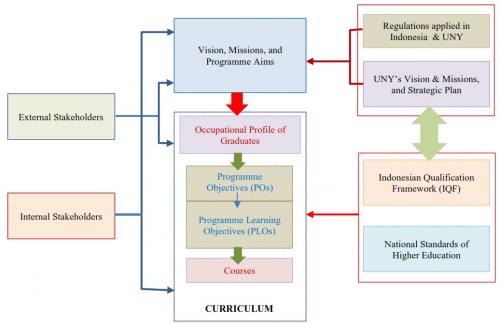You are here
Learning Outcomes on Master of Mechanical Engineering Education
Primary tabs
The profile of graduates Master of the Mechanical Engineering Study Program at UNY is determined based on the formulation of the UNY vision and mission and the level 8 Indonesian National Qualification Framework and the Regulation of the Minister of Education and Culture Number 3 of 2020 concerning National Higher Education Standards. The preparation of program objectives involves stakeholders including: educational institutions, representatives of the S1 Mechanical Engineering Education Study Program Semarang State University and Sebelas Maret University, business and industry, professional organizations: the Association of Indonesian Vocational Lecturers and Teachers (ADGVI), Indonesian Association of Technical and Vocational Education (APTEKINDO), Postgraduate Program Leadership Forum (FORPIMPAS), and alumni. The description of the mechanism for determining the Program Goals is described in the following chart.

Professions, fields of work, or scientific fields and expertise that can be filled by graduates of a Masters in Mechanical Engineering Education:
|
Job Position Profile |
Descriptions |
|
Educators in the field of mechanical engineering vocational |
Lecturers / teachers / instructors in vocational education institutions |
|
Researcher in the field of mechanical engineering vocational |
Researchers in the areas of mechanical engineering vocational: machining technology, metal fabrication, manufacturing design and drawing, industrial machine maintenance, and welding |
|
Vocational education consultant |
Consultants who provide considerations, suggestions, and conclusions on solving vocational education problems in the field of mechanical engineering |
|
Developers of vocational education and training programs |
Designers and developers of vocational education and training programs in mechanical engineering |
Academic objectives of the Mechanical Engineering Education S2 Study Program:
- Apply theoretical concepts in engineering, metal fabrication, manufacturing drawings, and design, engineering maintenance, and welding.
- Develop theoretical and practical concepts in the field of mechanical engineering vocational education.
- Carry out research and development in the field of mechanical engineering vocational education.
PERPUSTAKAAN
Kontak Kami
PROGRAM PASCASARJANA
Kampus Karangmalang, Yogyakarta 55281
Telp. +62274-550836 (front office), Hunting +62274-586168, Psw. 229; 285; & 367
Fax. +62274-520326
Website : http://s2ptm.ft.uny.ac.id
Copyright © 2026,
